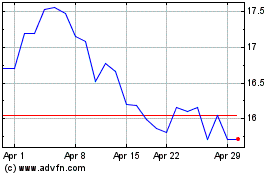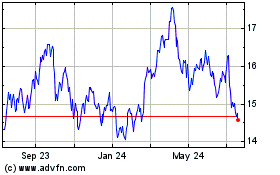Spanish Energy Giant Repsol Writes Down Oil, Gas Assets -- Update
December 03 2019 - 11:44AM
Dow Jones News
By Sarah McFarlane
Spanish energy company Repsol SA said it is cutting the value of
its assets by billions of dollars because the global transition to
a lower carbon economy is weakening the outlook for oil and gas
prices.
Repsol's move is the first by a major oil and gas player
acknowledging a lower value of its assets was linked to a long-term
view that a transition to less carbon-intensive energy will make
oil and natural gas less valuable.
The impairment charge won't impact cash payments to
shareholders, the company said, but it is likely to increase the
company's market cap-to-debt ratio, known as gearing. The charge,
totaling more than $5 billion, is set to show up in the company's
fourth-quarter results due in February.
"This valuation adjustment will mainly affect exploration and
production assets located in the United States of America and
Canada due to the reduction in the expectations of future gas
prices," said the company in a statement.
Energy companies have been reassessing the value of their
assets, particularly in the U.S., where natural gas prices have
been historically low, for the past couple of years. BP PLC's last
set of results included a $2.6 billion impairment charge, mostly
from selling U.S. assets at lower prices than it had on its balance
sheet.
Repsol, which controls around 8% of Europe's oil refining
capacity, also said it aims to achieve net-zero carbon emissions by
2050. That includes reducing greenhouse-gas emissions from the oil
products they sell, such as gasoline, which is similar to
commitments made by Royal Dutch Shell PLC. Many other energy
companies have resisted such moves.
The Madrid-based company's announcement coincided with the
United Nations' climate change meeting in the Spanish capital,
known as COP25, where governments are expected to negotiate ways to
limit the global temperature rise to less than 2 degrees
Celsius.
Some analysts said it was a coincidence that Repsol needed to
change its oil and gas price assumptions, and therefore asset
values, at the same time as the company is changing its strategy to
align with the energy transition.
Repsol bought Canada's Talisman Energy in 2015 in a deal which
included U.S. shale assets.
"They've got a significant North American asset base which had
quite aggressive oil and gas price assumptions, gas in particular,"
said Jason Kenney, an analyst at Spanish bank Santander, adding
that it had to be written down at some point.
Repsol has committed to invest a larger proportion of its budget
to zero carbon energy than its peers. It plans to more than double
its low-carbon electricity generation capacity to 7,500 megawatts
by 2025, mostly from renewable energy, with solar and wind projects
planned.
"Repsol's push into new energy is unique for a company of this
size; 17% of its overall budget is allocated to zero-carbon energy
over its three-year plan, way ahead of the majors," said consulting
firm Wood Mackenzie in a report.
--Max Bernhard contributed to this article
Write to Sarah McFarlane at sarah.mcfarlane@wsj.com
(END) Dow Jones Newswires
December 03, 2019 11:29 ET (16:29 GMT)
Copyright (c) 2019 Dow Jones & Company, Inc.
Repsol (QX) (USOTC:REPYY)
Historical Stock Chart
From Jun 2024 to Jul 2024

Repsol (QX) (USOTC:REPYY)
Historical Stock Chart
From Jul 2023 to Jul 2024
